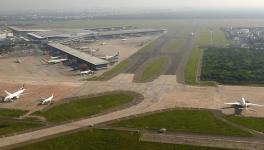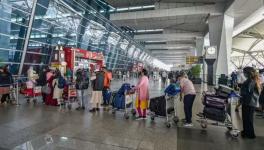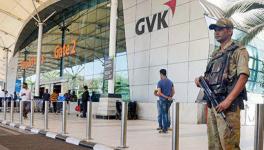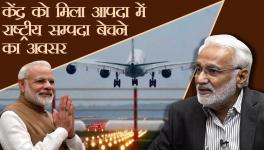AAI Employees Write to Civil Aviation Minister Opposing Privatisation

Terminal 2 of Thiruvananthapuram International Airport, which is one of the six airports that are being proposed to be privatised by the Narendra Modi government. Image courtesy: Muhammed Suhaill/Wikipedia
Airports Authority of India (AAI) Employees Joint Forum wrote a letter to Civil Aviation Minister Hardeep Puri, registering their protest against the proposed privatisation of the six profit-making airports across the country. The Government of India is currently in the process of privatising six airports, namely Ahmedabad, Jaipur, Lucknow, Guwahati, Mangaluru, and Thiruvananthapuram.
In the letter, AAI Employees Joint Forum referred to the previously privatised airports of Delhi and Mumbai, and said, “The privatisation of these airports have not brought any good to the country and the people at large as far as facilitation, providing additional employment to society, participation in the development of Aviation infrastructure in the country etc. are concerned. Moreover, privatisation has encouraged monopolistic operation, exploitation of employees and additional burden on the general public.”
Talking to NewsClick, Balraj Singh Ahlawat, the general secretary of Airport Authority Employees Union (AAEU) and convenor of the joint forum, said, “There is no financial support from the Government of India or any other sources. Our financial position has further been hard hit due to inability of Air India to clear our dues and other airlines, which have either folded their business and/or are at the verge of complete closure. The financial effect on AAI due to these developments is never compensated in any form.”
The employees of AAI have been constantly protesting against the move since it was declared in November, 2018. They have repeatedly held demonstrations at airports across the country, opposing the move to privatise six more airports. Ahlawat said that before the privatisation of Mumbai and Delhi airports, 60% of the income of AAI came from these two airports. After privatisation, the total revenue earned from these two airports has been reduced to 30% of the net income of AAI. He said, “As per the records of 2015-16, out of the net income of Rs 12,542 crore from all the airports, only Rs 3,836 crore came from Delhi and Mumbai airports.”
“Before privatisation, 60% of the income of AAI came from Delhi and Mumbai airports. However, after privatisation, that number has decreased to 30%. As per the records of 2015-16, out of the net income of Rs 12,542 crore from all the airports, only Rs 3,836 crore came from Delhi and Mumbai airports,” Ahlawat said, adding that this was an indication that income would further decrease after privatisation of these six airports, which are making good profits now.
Ahlawat added that the privatisation would lead to exploitation of the workers. “The AAI-managed airports have reservations for people from Scheduled Castes and Scheduled Tribes, which provides them with opportunities for work. However, after privatisation, staff will be hired only on contractual basis. And these contractual staff will be exploited by the private operators. We have seen this happen previously.” He also said the cost of services would also go up, as had been the case for the airports that had been privatised earlier.
The Joint Forum said, “The privatisation of Delhi and Mumbai Airports brought innumerable miseries to the employees of AAI, who had toiled hard even in adverse conditions and worked tirelessly for the development of airports from Kashmir to Kanyakumari and Bhuj to Imphal.”
According to the data given by the Joint Forum in the letter, four out of the six airports undergoing the privatisation process made profits in the year 2017-2018. Two of the airports, Guwahati and Mangaluru suffered losses during the same financial year.
They said in the letter, “These six Airports are profit making Airports and have managed best service quality standards and are the backbone of the financial structure of AAI. As AAI is also managing 83 Airports which are loss making and maintenance and upkeep of these Airports are met out of the revenue generated from these profit making airport which are earmarked for privatisation.”
They also mentioned that the Regional Connectivity Scheme (RCS), under which AAI is supposed to connect 22 underserved airports in its first phase at a cost of Rs 2,500 per hour of flight, has put an additional financial burden on the Authority. They said that RCS needs to be cross subsidised from the existing revenue from the profit-making airports, as a result of which it will become difficult for AAI to cover the expenditures for development, maintenance and operations of other airports.
AAI currently manages 125 airports, which include 18 international airports, seven customs airports, 78 domestic airports and 26 civil enclaves at defence airfields, and provides air navigation services over 2.8 million square nautical miles of air space. The Joint Forum said, “AAI, with great difficulty and excellent professional management have come out of the trauma of privatisation of Delhi and Mumbai airports and shall again be thrown into turmoil in case the Government of India pursues the policy of privatisation, without looking at the ground realities.”
Appealing to the Minister to review the proposed privatisation of six airports, the letter said, “The miserable conditions which the employees suffered at the time of privatisation of Delhi and Mumbai airports is fresh in our memories. The plight of the family members cannot be explained. We have seen families getting disintegrated and children suffering a lot. Those who could have risen in future in the undisturbed set up of AAI were left high and dry and are still stagnating in lower ranks with their futures completely blocked by the unimaginative decision of the government to privatise Delhi and Mumbai airports.”
Also read: How Modi Bypassed Norms to Try and Enable Adani’s Entry into Airport Business
Get the latest reports & analysis with people's perspective on Protests, movements & deep analytical videos, discussions of the current affairs in your Telegram app. Subscribe to NewsClick's Telegram channel & get Real-Time updates on stories, as they get published on our website.
























